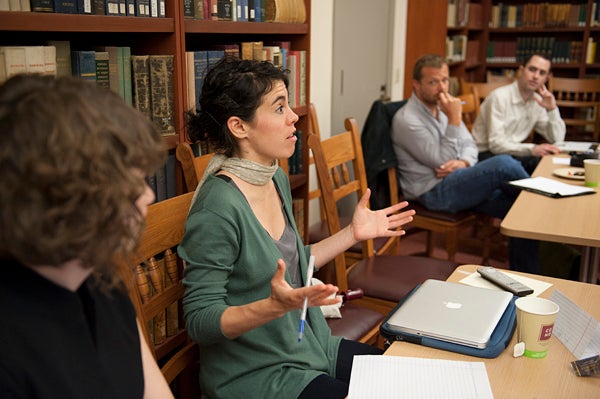|
May 8, 2012
Stanford humanities PhD students pitch their talents to high-tech executives
At Stanford's second annual BiblioTech conference, business-style elevator pitches will showcase the versatile assets of 21st century humanities graduate students. By Kelsey Geiser

Doctoral candidate Katie Hume talks with her peers about how best to present her disssertation work to tech industry leaders. (Photo: L. A. Cicero / Stanford News Service) To help close the gap between the academic humanities world and the high-tech universe, seven Stanford PhD students will do something unusual Thursday morning. At a campus conference, the potential job seekers will tell a tech panel about their humanities doctoral dissertations and why their abilities are valuable in Silicon Valley.
"The pitches will be a great opportunity for people outside of academia to learn more about what today's humanities PhD students are studying and writing about," said Anaïs Saint-Jude, the director of the BiblioTech program at Stanford.
"Since the theme of the conference is bridging the gap between the humanities and the tech world, we thought it would be fun to use the genre of the elevator pitch," she said.
The pitch
The PhD students, from departments ranging from Italian and English to linguistics, will have three minutes each to describe their dissertations to an audience including a panel of a half-dozen leaders from Silicon Valley and Stanford. They include the vice president of IBM research at Almaden, the senior director of global customer relations at LinkedIn and the chair of Stanford's Department of Classics. The U.S. technology correspondent for The Economist weekly newspaper will moderate.
The BiblioTech Program at Stanford aims to change the mindset of both academics and non-academics to recognize that the training received in a humanities doctoral program does in fact prepare students for careers in the business sector.
The second annual BiblioTech conference, "From Proust to Programming: Bridging the Gap Between the Humanities and the Tech World," will bring students, scholars and business leaders together in conversation. The conference is free and open to the public, but tickets are required from the Stanford Ticket Office.
The conference will also be streamed live on the web.
The half-day conference will begin at 8 a.m. at Stanford's Bechtel Conference Center.
The keynote speaker has himself bridged the gap. Geoffrey A. Moore, an author, adviser and venture partner at Mohr Davidow Ventures, has a bachelor's degree in literature from Stanford and a doctorate in literature from the University of Washington.
Through a combination of public programming, internships and outreach, BiblioTech seeks to facilitate a more symbiotic relationship between humanities doctoral students and Silicon Valley companies. A liberal arts education offers a unique and pertinent skill set that makes humanities PhDs "especially suited to important roles in companies, nonprofits, government and non-governmental and public policy organizations," said Saint-Jude.
Gabriella Safran, chair of the Division of Literatures, Languages, and Cultures and a panelist in the conference, said, "I think the people from business will be excited and inspired by the students' energy, intelligence, persistence and focus."
Humanities students suit up for internships
Launched earlier this year, the BiblioTech internship program seeks to place students in local companies and organizations to prove the talents of PhDs. One such student, Kathryn Hume, who works for VantageLocal, a local online advertising startup, will be featured in the conference's dissertation pitch program.
Hume has found that her PhD training has equipped her to understand the technical concepts required for her job and render them understandable. "I think that the primary value of BiblioTech is breaking down established prejudices about what it is that humanities students do and how they can be useful in other industries," Hume said.
Deb Tennen, a former PhD student at Stanford and a current employee at Shmoop, an academic startup, sees the benefits of the internship program from another vantage point. "Many PhD students have never known anything other than academia," said Tennen. "This gives them the chance to see what else is out there."
Roberta Katz, associate vice president for strategic planning at Stanford and a member of the roundtable discussion, said, "The focus on technology in the digital age has had the unintended consequence of understating the significance of humanities knowledge and wisdom. BiblioTech creatively addresses that problem by demonstrating the value of humanities expertise to modern-day businesses and agencies."
Kelsey Geiser is an intern with the Human Experience, the Humanities web portal for Stanford University.
-30-
|